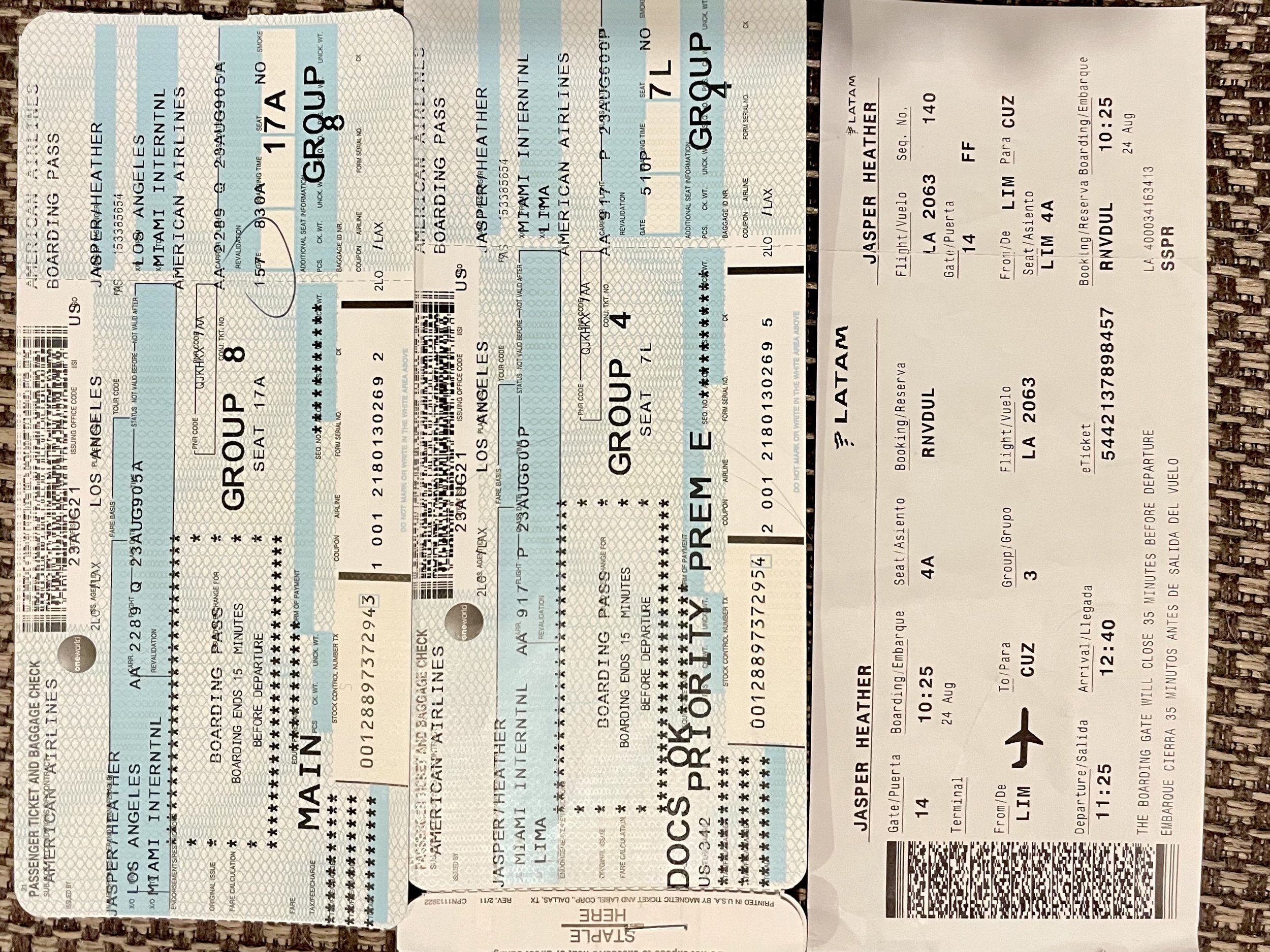Travel Tip 91
Reasons a country can deny you entry
Latam almost didn’t let me board my flight from Bogotá to Lima because I didn’t have a ticket leaving Peru.
Welcome to my newsletter! Every week I send you a travel tip, plus links to my new blogs and published articles!
Here’s ten reasons you can be denied entry - at least one will surprise you!
You saved and planned and are finally arriving in another country for your vacation – but what if they don’t let you in?
It sounds like a nightmare, but you can actually be denied entry for any number of reasons. For some of the more obvious issues, somebody else might catch the problem before you arrive. If you’re flying, an airline will notice if you don’t have a passport, or if your passport is expired, and not even let you board the plane. A cruise ship should do the same. Still, there are plenty of other ways you can arrive and be sent right back.
Canada, Peru, Chile, Argentina & Brazil all issue US citizens a tourist visa on arrival.
1. You need a visa before you arrive.
Depending on your nationality & passport, some countries require you to get a visa before arrival. Many countries issue a visa on arrival, which is why some people say there are countries that you don’t need a visa for. What they mean is that you don’t need to get a visa before you arrive. Most countries issue a 90 visa on arrival for tourists – but you have to check before you buy your flights or make any non-refundable deposits.
This has even happened to me – though I maintain it wasn’t my fault. In Seattle, I was refused boarding for my flight to Bangladesh because I didn’t have a visa for China. I told them that I didn’t need a visa because my layover in Beijing was less than 12 hours and they informed me that my connecting flight had been cancelled and that I was now rebooked on the same flight the next day. My layover was 24 hours longer than I anticipated but it was Sunday afternoon in Seattle and there was no way I could get a visa for China in the 2 hours I had before boarding. I had to buy a last minute ticket through Dubai.
2. Your passport expires soon.
Many countries require your passport to be valid at least six months after you arrive. These are very strict regulations almost everywhere in the world and they can refuse you entry if you’re off by even one day. Check your passport’s expiration date against the day you arrive in country, not the day you leave home.
Many tourists in Ushuaia get these stamps put in their passports (as did I) but that technically makes your passport invalid.
3. Your passport is damaged, has unofficial stamps or not enough pages.
I’m guilty of this one too. I have a Machu Picchu stamp in my passport and theoretically any country could deny me entry because of it. I’ve been traveling with that stamp since 2019 and nobody has caused a fuss about it yet, but I don’t recommend getting souvenir stamps in your real passport. Get something else to stamp if you like collecting souvenir stamps. Many countries require at least one fully blank page, so if your passport is close to full, get it renewed sooner rather than later.
4. Not having an onward ticket.
Most countries want to know that you have plans to leave and they want to see your ticket leaves their country before your tourist visa will expire. That’s usually 90 days but check the length of a tourist visa before you buy your flights. In Togo, my visa was only one week. Coming back to Peru after a trip to Colombia, they almost didn’t let me board my flight in Bogotá because I didn’t have a flight departing Peru. Thankfully, I had my Peruvian resident card with me because otherwise I would have had to buy a ticket leaving Peru before boarding. If that happens to you, buy any random flight that’s fully refundable and sort it out later.
If you need proof of onward travel, print out your boarding cards or tickets. Don’t rely only on your phone.
5. Not having enough money.
If you’re entering on a tourist visa, some countries will want proof that you have enough money to be a tourist in their country. Spain, Brazil, Egypt, India, and several other countries may ask for proof of funds. Research the country you’re going to and if there are any travel blogs or official websites that say you need proof of funds, bring bank statements and credit card statements showing your credit limit. They might allow you to show this information by logging into your bank or credit card apps on your phone, but don’t count on it.
6. Having a DUI or criminal record.
If you have anything on your record, check if a country would prohibit you from entering before you plan your trip to buy anything. Canada, Japan, and New Zealand can deny entry to people with a DUI on their record. The UK, Brazil, Japan, and South Africa can deny entry to people with certain kinds of criminal convictions.
7. Packing prohibited items
Some things are obvious: don’t bring illegal substances or weapons. Most countries prohibit some food items, like meat, fruits, and vegetables. Check the laws for any medications you take because even common meds like ADHD meds are illegal in some countries. Some countries prohibit even more obscure items. France doesn’t allow counterfeit brand purses, even for personal use. If you bought a Louis Vuitton purse at the San Pedro Market in Cusco, just know that it’s fake and don’t try to take it to France. Canada, Italy, Switzerland and the US prohibit knock-off designer clothing – especially fake Gucci, Fendi, Prada or Nike. Some countries, like Kenya, Tanzania, and Botswana prohibit plastic bags. Do your research!
When I was a teacher, I loved taking students on international trips but I had to be so very careful with documentation.
8. Not having correct documentation for a minor.
If you are traveling with anybody under 18, make sure that you know what documentation is required. This is even more important if you’re a single parent or traveling with somebody else’s child. When I was taking school groups from Bangladesh to Spain and from Seattle to Peru and France, I had to carry notarized letters from the parents of every student. For divorced parents, I had to get a separate letter from each parent. That last thing I wanted was to get charged with trafficking children – which almost happened with one Bangladeshi student in Doha on our way to Barcelona. It was terrifying.
9. Having an X gender marker on your passport.
Many countries now allow non-binary people and others on the gender spectrum to have an X on their passport instead of M or F. However, some countries prohibit the X gender marker and could deny entry over it.
10. Wearing camo
This is the only thing on the list that kind of makes me roll my eyes. However, there are some countries that prohibit civilians from wearing camo in any color combination. Most of them are in Africa and the Caribbean, but also the Philippines and Saudia Arabia – do your research. They probably won’t confiscate a camo t-shirt from your luggage, but don’t wear it until you get home.
New Blog
I did a lot more than carnival during my week in Cajamarca. Click on the blog title above to read about my favorite tours and my top tips for Cajamarca: what to do, where to go, where to stay, and where to eat.
I wrote about ceviche being the classic dish from Lima, because it has been for over a thousand years.
New Article
World’s 20 Best Cities for Food Right Now
I contributed the Lima review for this Time Out article – though I didn’t get to choose the ranking. I would have rated Lima after Bangkok and before Medellín. Click on the title above to see what cities the editor thought outranked Lima.







